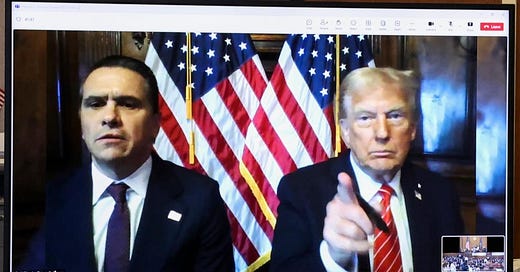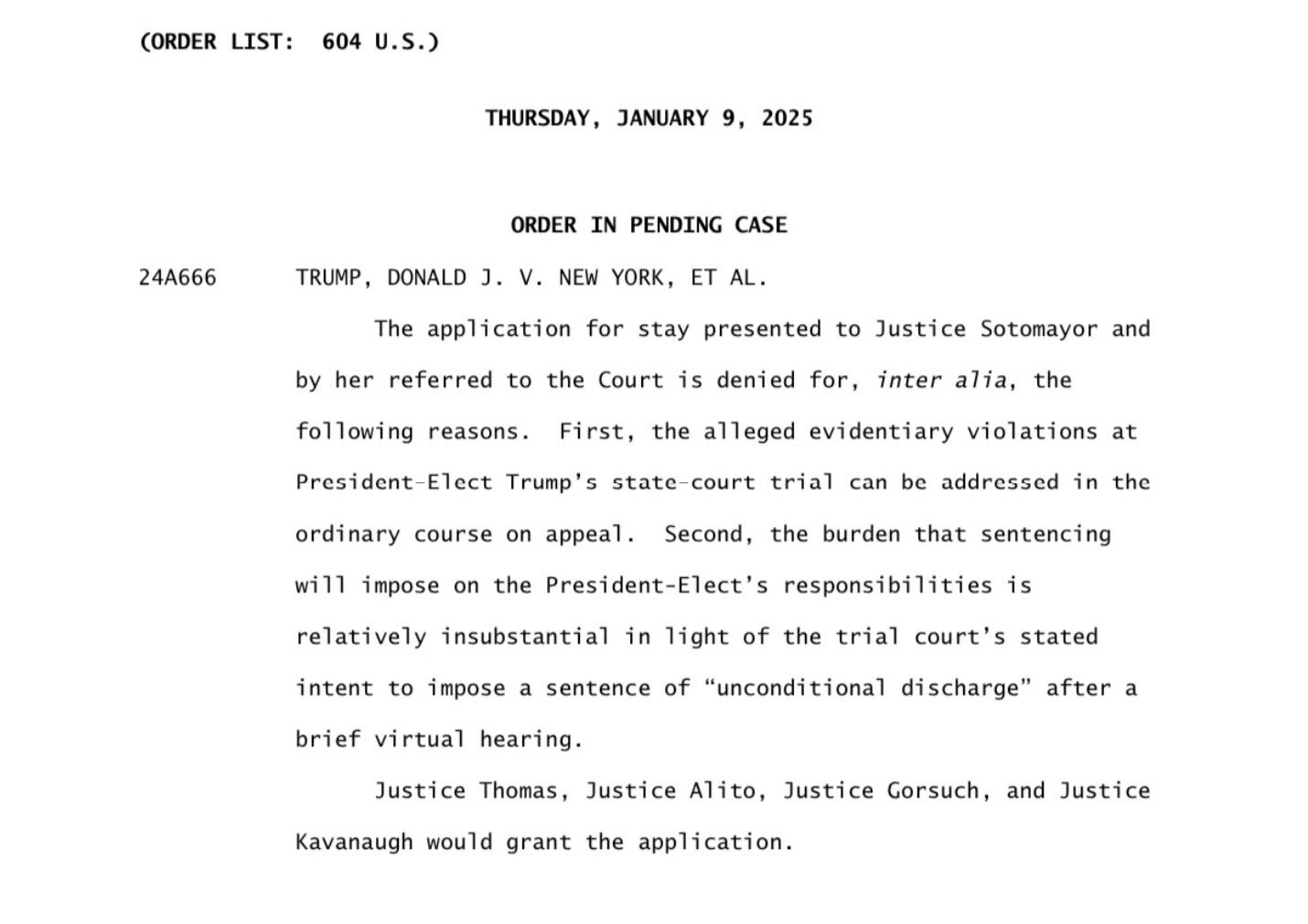Today New York justice Juan Merchan sentenced Donald Trump for his conviction on thirty-four state felony counts of making false business records. Merchan imposed a sentence of unconditional discharge. The unusual sentence means the conviction is on the books, but there are no other conditions: no incarceration, no probation supervision, no community service, no fines - nothing beyond the stigma of the conviction itself. Merchan had signaled this would be the likely sentence, and at the sentencing hearing today the DA recommended it as well.
This outcome satisfies almost no one — not Trump’s allies, who believe the entire case was a witch hunt that never should have been brought, and certainly not his critics, who believe this tap on the wrist is hardly a sufficient punishment. But given the Supreme Court’s immunity ruling last summer and Trump’s re-election, this was probably the best possible outcome that remained. It allowed Merchan to impose a sentence that would not impinge on Trump’s presidential duties, as the Supreme Court apparently now requires. And it brings finality to the case and cements Trump’s status as a convicted felon.
In this case, at least, Trump was not able to bend the legal system to his will and avoid accountability for his criminal acts. It’s a small victory for those who still believe in the justice system and that no one is — or at least should be — above the law.
Justice Merchan deserves a lot of credit here. He did a masterful job, both during the trial and in all the post-conviction maneuverings, to finally get the case to this point. His advance signal that he would sentence Trump to an unconditional discharge was critical to convincing the Supreme Court not to intervene. And he did all this in the face of Trump’s repeated personal attacks and insults. He’s a true judge’s judge.
Trump with attorney Todd Blanche appearing remotely at today’s sentencing
Supreme Court Refuses to Intervene
At Trump’s request, Merchan had postponed the sentencing, originally set for July, until after the election. After Trump won the election he sought to avoid having the sentencing take place at all, arguing that the Supreme Court’s immunity decision, errors during his trial, and his election victory and duties as president-elect all required that the case be dismissed entirely.
Merchan rejected those arguments and scheduled the sentencing for today. The New York Appellate Division followed by the New York Court of Appeals (the state supreme court) upheld that decision. Trump then sought an emergency stay from the U.S. Supreme Court.
On Thursday evening, in a brief order, the Court rejected his request. The vote was 5-4, with Justices Alito, Thomas, Gorsuch and Kavanaugh saying they would have granted the stay. Chief Justice Roberts and Justice Amy Coney Barrett joined the three liberals in rejecting Trump’s request.
The good news is that the Court refused to intervene. The bad news is that the vote was 5-4. Even if we assume Alito and Thomas are lost causes, it should have been 7-2. There was no principled reason for the Court to intervene in this state court proceeding involving events that took place before Trump was president. This vote effectively confirms there are four Justices willing to discard basic legal principles to give Trump almost anything he wants. That’s a discouraging sign for the future.
As a side note, Justice Barrett continues to be very interesting. Of Trump’s three appointees to the Court, she is the most principled conservative. Unlike Kavanaugh and Gorsuch, Barrett has refused to fall in line with the Trump agenda. She and the Chief Justice saw through the flimsiness of Trump’s legal claims for postponing the sentencing and were not willing to accommodate him.
In the presidential immunity decision, although Barrett voted in favor of immunity, she wrote a separate opinion criticizing the majority for going too far. And in Fischer v. United States, the case last June limiting the scope of an obstruction of justice statute used to charge hundreds of January 6 rioters (and Trump himself), Barrett wrote a compelling dissent, joined by liberals Kagan and Sotomayor, accusing the majority of ignoring the plain language of the statute.
Republican president Dwight Eisenhower reportedly once said he had made two mistakes as president and both of them were sitting on the Supreme Court. He was referring to Earl Warren and William Brennan, who were put on the Court by the conservative Eisenhower and went on to become two of the greatest liberal justices of the 20th century. Barrett may be unlikely to become Trump’s Earl Warren, but she must be a great disappointment to him. I don’t expect she is getting invited to any Mar-a-Lago parties anytime soon.
What Happens Now
Now that Trump has been sentenced, he can appeal his convictions through the state court system like any other defendant. The appeals will be handled largely by his attorneys so will not impose on his duties as president — one of the chief concerns of the presidential immunity decision.
Trump will argue that some evidence admitted in his trial was forbidden by presidential immunity, that there were other errors in the conduct of the trial, and that the charges against him were legally flawed. I think the last of these offers him the best chance. As I’ve written before, I’m not sure the state can show the required intent to defraud based on these internal records of a private company that were never shown to a government agency (or to anyone else). We’ll see what the New York courts have to say.
If he’s unsuccessful in the New York state courts, Trump will almost certainly ask the Supreme Court to throw out his convictions. That argument would be based primarily on presidential immunity; the Supreme Court is not likely to weigh in on issues of interpreting New York state law.
This appeals process will probably take 1-2 years or more. It will go on largely in the background while Trump is serving his second term. If any court were to reverse the convictions and order a new trial, that trial could only take place once Trump was out of office. It seems unlikely there would be any appetite for re-trying what would by then be a twelve-year old case.
Why the Sentencing Matters
You will hear some argue that this sentence is largely meaningless. Trump didn’t suffer any real consequences and received favorable treatment to which no other defendant would be entitled. It just shows once again, they’ll say, that he is above the law.
(As another aside, it’s not completely true that the conviction carries no practical consequences. As a convicted felon, Trump cannot own a firearm. It may affect his right to vote in Florida. A more amusing point: this website lists countries that may not allow you to enter if you have a felony conviction. The list includes Israel, Japan, New Zealand, and the United Kingdom — although we might assume a country would make an exception for the U.S. president. Canada also prohibits entry by felons in some circumstances, which may make those negotiations about becoming the 51st state a bit awkward.)
But as I wrote here in The Atlantic last November, it was still important for this sentencing to take place. When it comes to Trump, New York was sort of the rule of law’s last stand.
Special Counsel Jack Smith has dismissed his two federal prosecutions, based on Trump’s election and the DOJ policy that a sitting president may not be prosecuted. The only remaining battle now, which will play out over the next few days, is whether his reports of his investigations will be publicly released. Trump is fighting to keep them secret.
The Georgia state prosecution has been derailed by the Georgia Court of Appeals ruling that DA Fani Willis must be disqualified for a conflict of interest. She is appealing that decision to the Georgia Supreme Court. But even if she wins that appeal and the unwieldy case actually makes it to trial someday, it will be without the lead defendant Donald Trump. Even if Georgia puts his fourteen remaining co-defendants on trial for conspiring to overturn the state’s 2020 presidential election, it will not be allowed to include the sitting president in that prosecution.
But in New York, despite all of his frantic legal maneuvering, in the end Trump was not able to avoid something at least approaching justice. The case was not dismissed or postponed indefinitely. It is concluded, and he stands as a convicted felon.
The best response to a claim that this sentence was meaningless is to look at how mightily Trump struggled to keep it from happening at all. It clearly wasn’t meaningless to him. Regardless of the actual sentence, the legal status of “convicted felon” still matters. It has a meaning in the justice system and to those of us who respect that system. It matters for history, where he will ever be recorded as the first convicted felon to assume the office of the presidency. And it matters to Trump, who worries about his image above all else.
Today showed that Trump’s power is not unlimited. In this case, at least, the legal system withstood his assaults and reached a final determination of his criminal culpability. In the end, he was not able to prevent that from happening.
To those who still believe in the rule of law, that may be a small victory — but it’s not nothing.






It’s not clear to me why Trump’s lawyers thought it advantageous to seek a stay of the scheduled sentencing from the higher courts. If they had succeeded that would have left a good likelihood that that any sentencing would be delayed until after Trump finished his 4-year term as President. Not until then could the conviction be appealed looking for a reversal of the conviction. In the meantime, the public would still think Trump was a convicted felon. I suppose there would be some chance that if the stay had been granted once Trump was in office his lawyers would then move that the case should be dismissed. But that wouldn’t necessarily be granted.
Really Randall. Why do you say the case is concluded when there is an appeal filing?